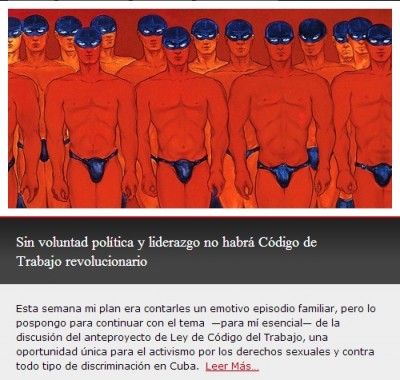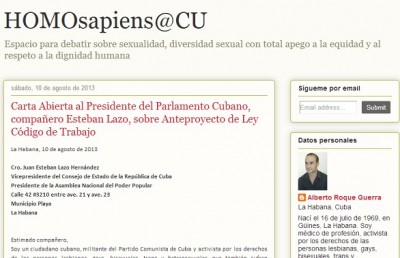[All links lead to Spanish language websites.]
The draft of the Cuban Labour Code [1] is being discussed as much in workplaces as in digital spaces based on the island. The law proposal, approved by the National Assembly of People's Power on December 2012, was launched on 10th July, creating debate in every workplace in the country.
 Since the publication of the regulations in Cuban official media, the document has also drawn the attention of various bloggers residing on the island. Journalist Francisco Rodríguez produced two responses to the aforementioned draft in his blog PaquitoeldeCuba [2].
Since the publication of the regulations in Cuban official media, the document has also drawn the attention of various bloggers residing on the island. Journalist Francisco Rodríguez produced two responses to the aforementioned draft in his blog PaquitoeldeCuba [2].
In the first [3] of them, Rodríguez, besides making specific proposals about amendments to the wording of the law, also encourages the sex diverse community to participate in the debate:
El reconocimiento del derecho al trabajo con independencia de la orientación sexual o la identidad de género de las personas podría incluirse en una nueva ley, si todos los trabajadores y las trabajadoras que somos homosexuales, bisexuales o trans proponemos en nuestras secciones sindicales una adición al anteproyecto de Código de Trabajo que actualmente se discute en Cuba mediante consulta popular.
The recognition of the right to employment regardless of the person's sexual orientation or gender identity could be included in a new law, if all us workers who are homosexual, bisexual or transsexual propose an addition to the Labour Code draft in our union sections, which is currently being discussed by way of referendum.
Cruz's main preoccupation, exposed in his second post [4], is the need for political will in the voices of the decision-makers of the country, so that those and other suggestions on the inclusion of homosexuals, the transgendered, etc. are taken into account in the mentioned law.
Los expertos que redactaron la propuesta de ley no solo obviaron cualquier mención explícita a la discriminación por orientación sexual e identidad de género en el entorno laboral, sino que tampoco pusieron en blanco y negro el derecho al trabajo para las personas discapacitadas y seropositivas, aunque en este último caso sí se mantiene una protección salarial cuando asistan a las consultas médicas programadas.
Not only did the experts who wrote the law proposal avoid any explicit mention of discrimination due to sexual orientation and gender in the working environment, but they also did not establish explicitly the right to employmentfor those disabled and HIV-positive, although in the latter's case, there is indeed a wage protection for when they attend scheduled medical consultations.
Meanwhile, on 10th August the doctor Alberto Roque published an open letter to the president of the National Assembly [5], Esteban Lazo, in his blog, in which he leaves “evidence of the discriminatory acts that persist in our country's work environment.”
 Furthermore, in the missive, Roque reveals that discriminatory concepts are used in the text, some of them surmounted in the social sciences, such as that of race, while demanding the inclusion of workplace harassment within the mentioned law to be assessed:
Furthermore, in the missive, Roque reveals that discriminatory concepts are used in the text, some of them surmounted in the social sciences, such as that of race, while demanding the inclusion of workplace harassment within the mentioned law to be assessed:
Considero necesario incluir en el Anteproyecto un artículo específico que defina el acoso moral en el trabajo, su identificación, así como hacer mención a las obligaciones de la administración y del Sindicato de crear espacios y ambientes seguros para los trabajadores víctimas de mobbing.
I consider it necessary to include a specific article in the draft that defines psychological harassment at work, its identification, and mention the obligations of the administration and of the union to create safe spaces and atmospheres for workers who become victims of mobbing.
The new Labour Code has also provoked analysis on how it contradicts other already-existing laws in the country, in particular the Constitution of the Republic. In the post Solavaya con este código [6], Rogelio Manuel Díaz Moreno, member of the Observatorio Crítico [Critical Observatory], admits that “the draft violates the secular state and discriminates among religions, given that one enjoys two days of holiday and the rest, not one.”
More recently, the lawyer Deyni Abreu, founder of the project Alianza Unidad Racial [Racial Unity Alliance], has been circulating her notes [7] about the Labour Code through the web, some of which are more general while others are specifically related to racism and discrimination in Cuba. With respect to the latter, she thinks:
Un inconveniente puntual en los centros de trabajo se observa en la inexistencia de herramientas legales que protejan al trabajador, si el empleador lo humilla o comete maltrato, irrespeto, desde su jerarquía, proveyéndose de acepciones racistas o si otro trabajador origina un conflicto desde el imperativo del color de piel.
A punctual disadvantage in workplaces is observed in the lack of legal tools that protect the worker if the employer humiliates, mistreats or disrespects him, from their hierarchical position, using racist terms, or if another worker causes a conflict stemming from the skin colour.
Abreu considers the Cuban Criminal Code's plans with regard to racial discrimination to be insufficient, and recognises the need for the present law project to strongly include this matter. Likewise, she believes that all possible discrimination of an explicit nature needs to be named.
On 15th October, the discussion period for the Labour Code Draft in Cuba closes, a debate that has been organised jointly by the Ministry of Labour and Social Security and the Cuban Workers’ Union, the only organisation of its type in the country.